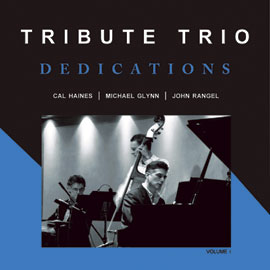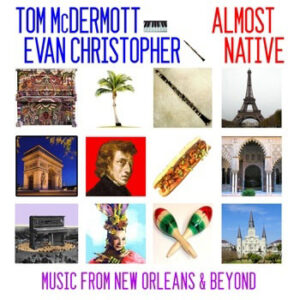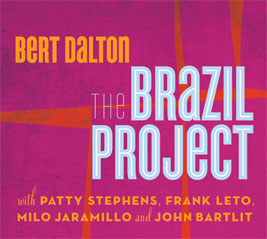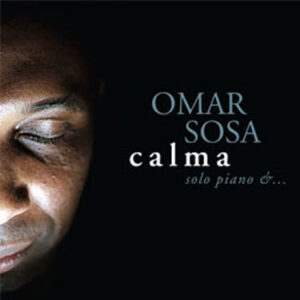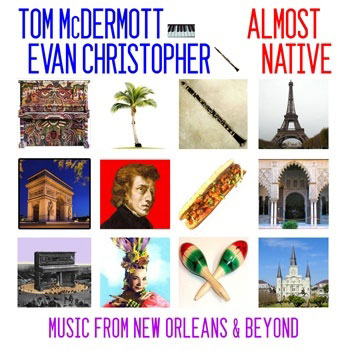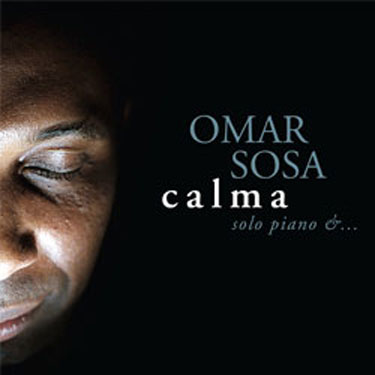Anyone who thinks jazz is dead is obviously not on the email lists of music publicists. Press releases for new recordings swamp the inbox daily. Here’s a handful of recent local and national releases, culled from the flood, that deserve attention.
Tribute Trio Dedications, Vol. 1 (tributetrio.com)
In a just-completed yearlong series, the Santa Fe / Albuquerque–based Tribute Trio—John Rangel (piano), Michael Glynn (bass) and Cal Haines (drums)—presented 12 monthly concerts, each focused on a different jazz pianist/composer. On Dedications, they use the insight gained as inspiration for nine original and compelling compositions, delivered with dazzling musicianship and a hand-in-glove responsiveness established over months of collaboration. While the tunes may be inspired by jazz masters, the trio has established a sophisticated voice of its own that invites, and will bear, repeated listening. From finger-popping blues to serpentine songs to impressionistic ballads, Dedications is a top-drawer, soul-satisfying experience.
Tom McDermott and Evan Christopher Almost Native (Threadhead Records)
Pianist Tom McDermott may be the Erik Satie of syncopated piano, given his penchant for composing tunes that stick in your head, his weakness for haunting minor-key lugubriosity and his antic, irreverent sense of humor. Clarinetist Evan Christopher, his partner on this delicious duo recording (as on 2002’s Danza ), has the most beautiful tone you might ever hear; he can break your heart with a column of vibrating air. Almost Native offers 11 original tracks on a sonic tour of New Orleans, Rio, Buenos Aires and Parisian backstreets via blues, R & B, choro, tango, musette and trad jazz.
Tommy Gearhart I Fall in Love Too Easily (Heavy Sounds Records)
Albuquerque’s jazz crooner Tommy Gearhart gets to the heart of the matter on this 12-track collection which includes two originals. Though he owes a debt to the masters who have preceded him, Gearhart finds his own approach to the challenges of the standard repertoire. He pares away the superfluous and presents the kernel of a tune directly and honestly in a warm, velvet baritone. He’s backed by an absolutely stellar band that includes producer Doug Lawrence (sax, flute), Bobby Shew (trumpet, flügelhorn), Tony Cesarano (guitars), Steve Figueroa (piano, organ), Michael Glynn (bass) and Chase Ellison (drums).
Bert Dalton The Brazil Project (Trialog Records)
As reedman Arlen Asher noted on a recent KSFR broadcast, pianist Bert Dalton brings tremendous joy to his work, and it serves him well on this celebration of Brazilian music. The first track, “Tudo Joia (Joyful Samba),” opens with an enthusiastic percussive burst that would be welcomed in any Carnaval parade. From there on, the recording insists on lifting your spirits. Dalton’s band—Patty Stephens (vocals), Rob “Milo” Jaramillo (bass), Frank Leto (percussion) and John Bartlit (drums)—expertly captures the exuberance and sensuality of Brazilian music. Dalton’s propulsive joy on upbeat numbers and his sensitive playing on ballads seals the deal.
Omar Sosa Calma (Ot‡ Records)
Cuban pianist/composer Omar Sosa brings his shaman powers to this live studio recording, where purity of intention is reflected in its purity of sound. Sosa plays an acoustic grand piano on 13 short, freely improvised compositions, simultaneously adding a sonically subtle penumbra via the economic and evocative use of Fender Rhodes, electronic effects and sampled sounds. His compositional palette references Satie, Cuban son , Spain’s memory of the Moors, African roots and, most unexpectedly, the distinctive chording of North American hymns and folk music. Open and unguarded, Calma immerses the listener in a healing oasis of reflection and hope.
Gretchen Parlato The Lost and Found (ObliqSound)
On The Lost and Found, singer/songwriter/lyricist Gretchen Parlato explores the contradictions and conundrums of love and being. The cunning fragility of her voice allows Parlato to squeeze into some tight emotional spaces and open them up, but you might find yourself wishing that she’d open up her amazing vocal instrument a bit more than she does. The recording inhabits a fairly narrow dynamic and emotional range, so although the material is of consistently high quality, it can begin to wear. Parlato really nails it on the title track, which sums up the central theme in a laconically Zen-like way.
